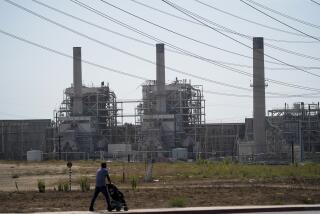Clear Rules for Closing Nuclear Plants Urged
- Share via
WASHINGTON — The Nuclear Regulatory Commission should set overall guidelines on closing nuclear power plants for safety violations, the General Accounting Office said Tuesday.
And Sen. Alfonse M. D’Amato (R-N.Y.), who requested the study by the congressional watchdog agency, said the NRC should not license any new plants until it implements that and other recommendations.
The report called on the NRC to “provide utilities clear signals on the types of safety and management problems that could result in a shutdown.”
It contended that the NRC allows safety violations at plants to continue for so long that accidents sometimes force the utilities to shut the plants themselves.
“The report shows that the NRC has failed in its basic responsibility” to protect the public, D’Amato said at a news conference. He called the report “rather damning.”
D’Amato also released a letter he had written to NRC Chairman Lando W. Zech Jr., asking him to explain “how you intend to implement the GAO’s recommendations.”
“Until the commission implements the GAO recommendations and improves the performance in these areas addressed in the report, no further actions should be taken to license additional nuclear facilities, particularly the Shoreham plant on Long Island,” D’Amato wrote.
NRC spokesman Joseph Fouchard said Tuesday that the commission was studying the report and that Zech would reply to D’Amato’s letter.
Inconsistency Seen
The GAO report said that, although the NRC has ordered shutdowns at five plants in the last 25 years, “its decisions to close these plants or allow continued operations look inconsistent because it did not take the same action for other plants with similar problems.”
The GAO reviewed the history of five plants that, despite repeated violations, the NRC did not close: Davis-Besse in Oak Harbor, Ohio; Rancho Seco, near Sacramento, Calif.; Pilgrim, in Plymouth, Mass.; Brunswick, in Southport, N.C., and Browns Ferry, in Decatur, Ala. Of those, all but Brunswick wound up being shut down by the operating utility because equipment failures or safety incidents made continued operation impossible.
“The absence of guidelines to determine whether a plant should be closed may have contributed to the prolonged operation of these plants,” the GAO said.
More to Read
Sign up for Essential California
The most important California stories and recommendations in your inbox every morning.
You may occasionally receive promotional content from the Los Angeles Times.













